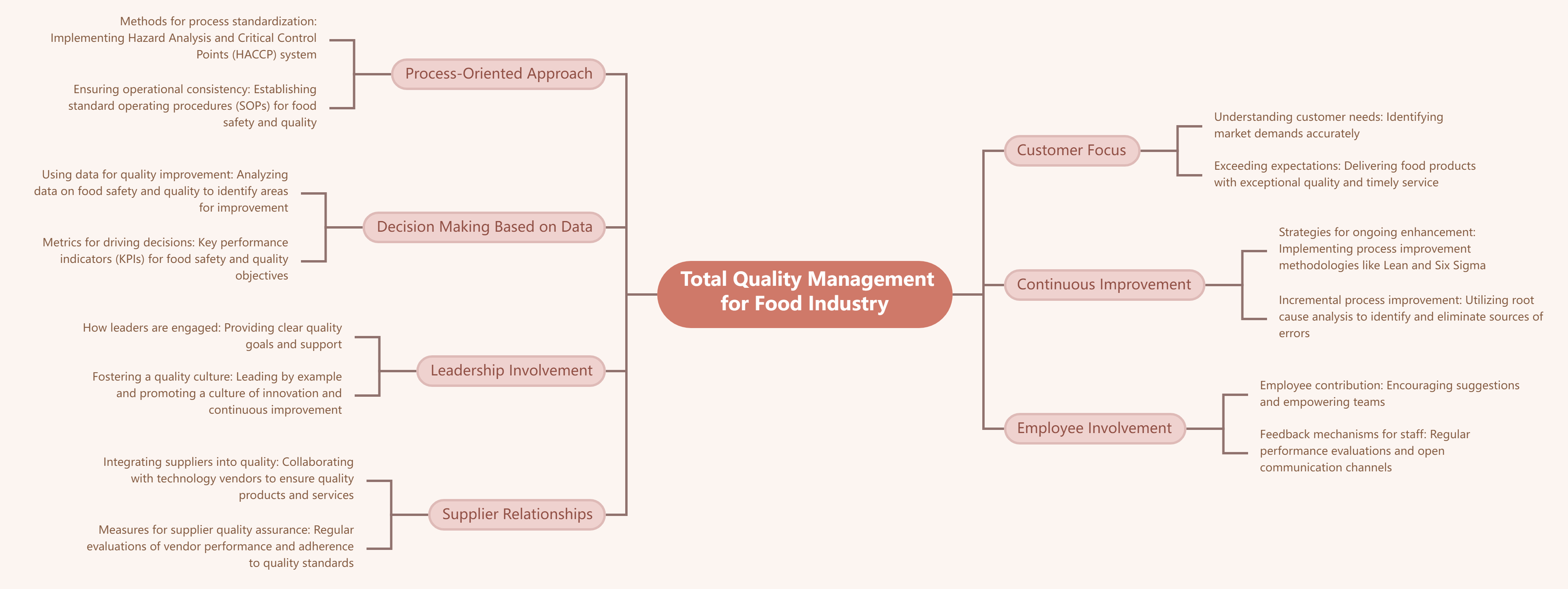
Description of the Mind Map Content
This mind map outlines the principles and strategies of Total Quality Management (TQM) specifically tailored for the food industry. The key focus areas are organized into distinct categories:
- Process-Oriented Approach:
- Methods for process standardization: The implementation of Hazard Analysis and Critical Control Points (HACCP) system.
- Ensuring operational consistency: Establishment of standard operating procedures (SOPs) for food safety and quality.
- Customer Focus:
- Understanding customer needs: Identifying market demands accurately.
- Exceeding expectations: Delivering food products with exceptional quality and timely service.
- Decision Making Based on Data:
- Using data for quality improvement: Analyzing data on food safety and quality to identify areas for improvement.
- Metrics for driving decisions: Utilizing key performance indicators (KPIs) for food safety and quality objectives.
- Continuous Improvement:
- Strategies for ongoing enhancement: Implementation of process improvement methodologies like Lean and Six Sigma.
- Incremental process improvement: Utilizing root cause analysis to identify and eliminate sources of errors.
- Leadership Involvement:
- How leaders are engaged: Providing clear quality goals and support.
- Fostering a quality culture: Leading by example and promoting a culture of innovation and continuous improvement.
- Employee Involvement:
- Employee contribution: Encouraging suggestions and empowering teams.
- Feedback mechanisms for staff: Regular performance evaluations and open communication channels.
- Supplier Relationships:
- Integrating suppliers into quality: Collaborating with technology vendors to ensure quality products and services.
- Measures for supplier quality assurance: Regular evaluations of vendor performance and adherence to quality standards.
Insights from the Mind Map
- The TQM framework for the food industry emphasizes the integration of quality measures into every aspect of the business, from processes and customer focus to data-driven decision-making.
- Continuous improvement is a central theme, with strategies like Lean, Six Sigma, and incremental improvements through root cause analysis highlighted.
- Leadership and employee involvement are critical, creating a culture of innovation, continuous improvement, and customer satisfaction.
- Supplier relationships are viewed as integral to overall quality, with collaboration and regular evaluations to ensure adherence to standards.
Creating Mind Maps with Visual Paradigm Smart Board
Visual Paradigm Smart Board emerges as a sophisticated yet user-friendly mind map app, offering a seamless experience for creating comprehensive visual representations. As a versatile mind map maker and online brainstorming tool, it facilitates the development of structured plans and ideas. This mind map tool goes beyond conventional brainstorming software, providing features like process-oriented approach visualization, customer-focused strategies, and robust decision-making based on data analysis. With its online mind map software capabilities, Visual Paradigm Smart Board enables collaborative efforts in real-time, fostering a dynamic environment for teams to work collectively on refining processes and achieving quality objectives. It serves as a valuable resource for those seeking an effective and intuitive platform for translating concepts into actionable plans.